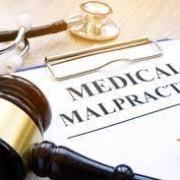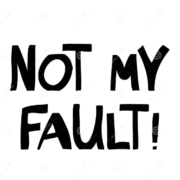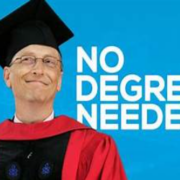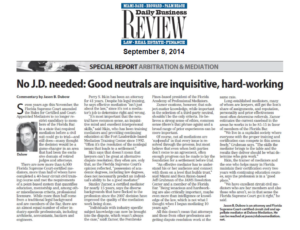“When in the worst of circumstances, we can find the best in people…” This is a statement I use during mediations. Whether mediating between disputing companies or families, all disputes must have at least two people prepared to negotiate and address high emotional concerns. Similarly, when a patient is dealing with the perception of improper care, misdiagnosis, or wrongful death due to negligence, they feel emotionally hurt, betrayed and demand satisfaction. The harmed and damaged patient seeks legal counsel and they usually file suit, a malpractice claim against the physician, his/her practice and any other person who can be attached to the claim. When a physician is faced with a malpractice claim, they also feel emotionally hurt and betrayed by the patient and immediately seek the advice of their insurer and legal counsel in order to protect themselves, preserve certain rights they may have, and to avoid admitting negligence. The physician often never gets a chance to speak directly to the patient again, and the patient often never gets a chance to address the physician directly with their concerns and emotional pain. With a legal action filed, the adversarial lines are drawn, the litigation process engaged, and the dispute is now reduced to numbers, statistics, and expert opinions. At this point, is it possible to address both parties’ needs/wants and provide each party with a resolution that resolves the case in a less adversarial manner? Yes, through the process of mediation. Mediation offers an opportunity to reach an amicable resolution often not found in litigation. Mediation offers its participants an opportunity to share their story (in their own words), to humanize the dispute, to share and gain perspective of what happened, and often it gives an opportunity to say “sorry” (should an apology be appropriate).
Florida has long been a known as the “…So Sue Me State…” where tort reform remains a hot topic and precedent continues to be made on both sides of the issue. Recognizing the time, cost and the immense consumption of resources involved when litigating a medical malpractice case, the use of mediation as an alternative to litigation is now being seen as an invaluable way to resolve disputes. Under Florida Statute 766.108, Mandatory mediation and mandatory settlement conference in medical negligence actions —
(1) Within 120 days after the suit is filed, unless such period is extended by mutual agreement of all parties, all parties shall attend in-person mandatory mediation in accordance with s. 44.102 if binding arbitration under s. 766.207 has not been agreed to by the parties. The Florida Rules of Civil Procedure shall apply to mediation held pursuant to this section…
This provision of the Florida Statutes provides for the process of mediation to be engaged and used to resolve mediation medical malpractice disputes.
The Process of Mediation
Mediation needs to be referred to as a “process” or “conference”; it is not a court hearing or a court session. Mediation is not an extension of the court system, and should not be considered something you check-off in a box on the way to trial. Mediation is a confidential, voluntary process facilitated by a mediator who is an unbiased neutral (an expert at resolution and not solely an expert in a particular subject matter). Whether court appointed or agreed to by both parties, a mediator is engaged (not hired) to assist with the negotiation process under the unwavering principle of party self-determination. Mediation is an opportunity to reach a settlement agreement that is mutually sufficient; and is an alternative to litigation where disputes pertaining to wrongful death, catastrophic injury and negligence can be resolved. Mediation seeks to reach a “Win/Win” solution to a dispute. The mediator can be Circuit Civil Supreme Court Certified and posses the ability and skill to assist the parties with their dispute. Although often court ordered, a mediation is not a court event, but rather it is an informal conference where the parties can appear pro se (self-represented) or with legal representation. Whether the parties have an attorney, or appear pro se, it is the mediator’s role and task to ensure a fair and balanced process.
There are various aspects of the mediation process, but none as important as the Opening Statement. An Opening Statement is where the mediator introduces themselves, the process and has the opportunity to set up the entire process. The Opening allows for the mediator to build rapport and the tone for a fair and balanced process is set with a good opening statement.
Mediations are only effective when both parties are prepared to explore settlement opportunities and they wish to make a good faith effort to resolve the case. Attending mediation with the sole purpose to persuade the other party that their case is weak, and you’ve to proof it, is a recipe to failure. The mediation conference can be held at one of the attorney’s office or at a neutral location selected by the mediator. Mediators are ethically bound and strictly prohibited, from giving legal advice, opinions, and can not assist with legal strategy. A mediator’s role is to assist with consensus building, creating a non-adversarial nonthreatening environment and to help create options for an amicable settlement.
A Medical Malpractice mediation is an emotional process, but with a skilled mediator who understands how to help the parties communicate their needs and reach consensus, it can be an opportunity for venting and allowing the parties to feel their emotional concerns are heard and valued. Mediation can explore different settlement options with all parties and help everyone reach a comfortable plan of action. If the parties are ready to resolve the case, a settlement agreement will be drafted and signed by the mediation participants that same day. The mediator would then file a mediation report and the attorneys would file the appropriate documents ending the case. If a settlement agreement is not reached, then the mediator files a report with the court, only stating that there was no agreement, and the litigation process proceeds.
The Promise
Litigation can be a long and painful, where often litigation participants have to relive painful events repeatedly. Even when a case seems to be a simple win for one party because the facts appear to be strongly supporting their case, there are never any guarantees that a judge or jury will see the same set of facts, in the same way. Litigants rarely have closure and are unable to move forward as the cost, anxiety and the uncertainty of litigation is pending for years. Litigation in a medical malpractice case can cost anywhere from tens of thousands to millions of dollars, and can last for up to 3 years (or even longer). Contrary to the cost, timing, and uncertainty of a court decision, mediation offers an opportunity to be more time and cost efficient, address participants concerns in their own voice and create options and solutions that are often not seen in litigation. Medical Malpractice mediation can take several hours and costs as fractions of what litigation. The promise of mediation is in its process, and how the process of mediation can transform an adversarial painful dispute into an opportunity where all parties mutually benefit from a settlement they created and agree to. When facilitated by a skilled mediator the harmed party feels heard as often emotional needs are met. Simultaneously, the physician can also feel heard, address their emotionally concerns, preserves lost trust and the physician gets a chance to share their humanity during the process. Mediation can truly be a win/win for all.
====================================================================
Stanley Zamor is a Florida Supreme Court Certified Circuit Civil/Family/County Mediator & Trainer and Florida Supreme Court Qualified Arbitrator. He is the current President, Florida Academy of Professional Mediators, Inc. (Florida’s first statewide ADR not-for-profit, est. 1988) and has a private ADR company where he mediates/arbitrates, facilitates workshops and regularly lectures on a variety of topics from cross-cultural issues, diversity, bullying, dispute resolution.






